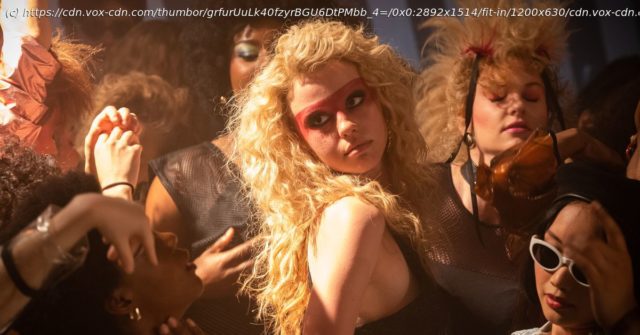Ti West’s X and Pearl reference Alfred Hitchcock, Disney movies, and ’70s slashers. The third movie references 1980s thrillers — and gets lost in the sleaze.
Ti West’s Maxxxine, the third movie in the horror trilogy West started with 2022’s X and Pearl, features an early scene where a man’s naked scrotum is graphically popped under a stiletto heel, then crushed underfoot. It’s a close-up shot, handled with presumably practical effects and squirm-inducing anatomical specificity. There is, obviously, a lot of screaming. It’s the kind of shot designed to make audiences squirm, flinch, cross their legs protectively — and possibly also laugh, because it’s so grotesquely over the top. And it’s the kind of moment that makes thoughtful genre fans wonder exactly where the line is between exploitation-film homage and just plain exploitation.
Maxxxine is a reference-packed movie, like X and Pearl before it. All three movies pay homage to previous eras of cinema: X, set in 1979, is a visual and narrative throwback to ’70s slashers, particularly The Texas Chain Saw Massacre. Pearl, set in 1918, is patterned after classic ’50s musicals and Disney movies. And Maxxxine, set in 1985, takes a lot of its visual and narrative cues from ’80s horror-thrillers — particularly Brian De Palma’s Body Double, though sex-soaked revenge dramas like Abel Ferrara’s Ms. 45 get their nods, too.
But where X is more interested in characters and the philosophies of fame, sex, and pornography than movies like Texas Chain Saw Massacre, and Pearl isn’t a musical or family-friendly movie, there’s no significant distance between Maxxxine and the kind of sleazy, slobbery, violence-savoring films it’s referencing. (Though there’s a world of difference between it and Alfred Hitchcock’s Psycho, which West repeatedly quotes in his shots and sets throughout the whole trilogy.) The film doesn’t come across as ironic, satirical, or like a thoughtful analysis or commentary. It’s the first of the three that could actually be considered a new entry in the genre it’s referencing.
That shift isn’t a positive step. Maxxxine is sharper, slicker, faster-paced, and more direct than the other two films in the series, and it’s certainly entertaining, for those who can stomach its purposefully challenging, envelope-pushing gore. But this time around, it feels like West has, as Kurt Vonnegut would put it, become what he was formerly just pretending to be. That isn’t just a matter of taxonomy, irrelevant to everyone but nitpickers and librarians trying to figure out which shelf Maxxxine goes on.
Start
United States
USA — software Maxxxine isn’t just paying homage to exploitation thrillers — it is one






